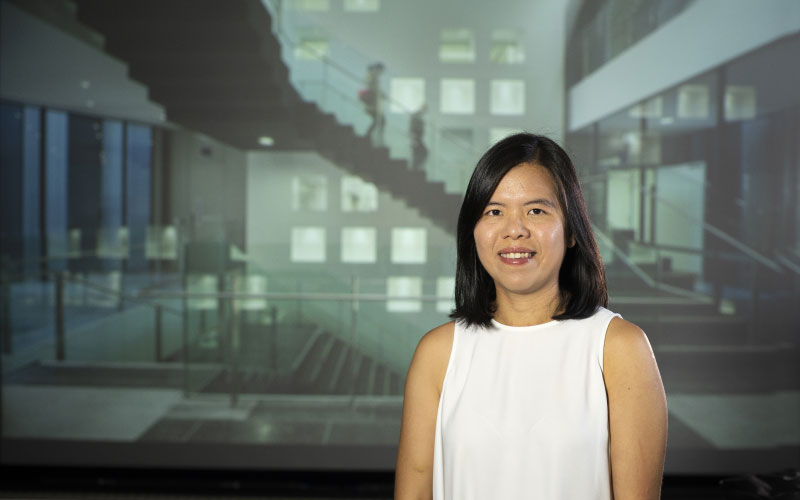Researcher Highlights
New hope for women with ovarian cancer
Dr Michelle Wong-Brown’s research is breaking new ground in the treatment of one of the world’s deadliest diseases: ovarian cancer.

Dr Michelle Wong-Brown’s research is contributing to a growing body of knowledge about how women with ovarian cancer respond to chemotherapy. Specifically, it looks at why some women respond poorly—or not at all— and how alternative treatments present an opportunity to improve survival rates.
Out of all cancers, ovarian cancer has one of the poorest prognoses, especially when diagnosed late. The five-year survival rate is just over 44 per cent. Many women with ovarian cancer will undergo surgery, potentially followed by chemotherapy. However, recurrence typically occurs in up to 75 per cent of patients who can then develop resistance to chemotherapy.
There is a growing body of evidence—including Michelle’s research—showing that women with ovarian cancer often display a deficiency in their DNA’s ability to repair itself following chemotherapy. Known as homologous recombination (HR) deficiency, this condition can make women resistant to chemotherapy and hinder their chances of survival.
“Currently, when a woman doesn’t respond to chemotherapy—typically because of her DNA’s inability to repair itself—she’s told that nothing further can be done. Well, that simply isn’t good enough.”
Michelle’s research is helping to turn the tide for women with ovarian cancer, creating new hope and solutions.
“My highest goal is to eradicate ovarian cancer altogether. While this might not happen in my research lifetime, there are steps we can take today towards this goal—like providing patients with treatment options that will have the best outcomes for them.”
A life-changing revelation
Michelle’s interest in understanding DNA repair pathways was piqued in 2017 by her mentor: Associate Professor Nikola Bowden.
Until that point, Michelle had been investigating BRCA genes (the body’s natural tumour suppressors), which, in their mutated form, can increase predisposition to breast cancer. Associate Professor Bowden’s research showed that DNA repair pathways, including those associated with BRCA genes, could be involved in chemotherapy resistance in ovarian cancer patients.
The revelation set Michelle’s research career on a whole new path.
“Nikola and I decided to combine our expertise, knowledge, and data to find ways to overcome this resistance and improve treatment outcomes for women with ovarian cancer.”
Trialling new solutions
Michelle’s postdoctoral research with the DNA Repair Group, based at the Hunter Medical Research Institute (HMRI), includes developing and implementing new clinical trial testing drug combinations that haven’t been used to treat ovarian cancer before.
The multi-disciplinary trial, conducted in collaboration with oncologists at the Calvary Mater, will use existing drugs that have already undergone safety and efficacy tests—meaning they can be put into practice for patients faster.
“I’m excited to become more actively involved in clinical trials. If we discover effective new drug combinations, we can give patients with no remaining treatment options another chance.”
As well as testing existing drugs in new combinations, Michelle will also trial new drugs to treat ovarian cancer by slowing or halting its growth.
“We are looking at whether these new drugs, on their own or in combination, can slow the growth, stop the growth, or kill the ovarian tumour completely.”
Michelle’s work on developing DNA repair profiles that identify HR deficiency will help oncologists determine which patients are likely to respond well to chemotherapy, allowing for more personalised, targeted treatment.
“Information about a patient’s profile can help us predict the best treatment option for them. Patients predicted to have no long-term benefit from chemotherapy, based on their expression profiles, can be spared the toxic side effects.”
Michelle was the first recipient of the HMRI Karen Brown Breast Cancer Travel Award in 2014. In 2018, she participated in the University’s ThinkWell Early and Mid-Career Women’s Development Program, facilitated through the Faculty of Health and Medicine's Gender Equity Committee.
The University of Newcastle acknowledges the traditional custodians of the lands within our footprint areas: Awabakal, Darkinjung, Biripai, Worimi, Wonnarua, and Eora Nations. We also pay respect to the wisdom of our Elders past and present.